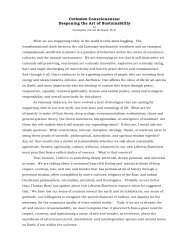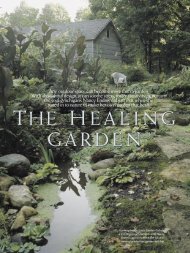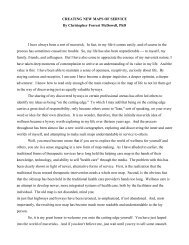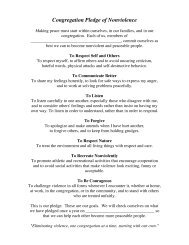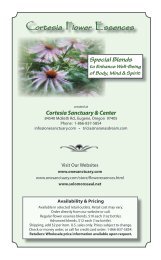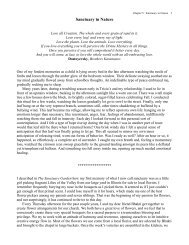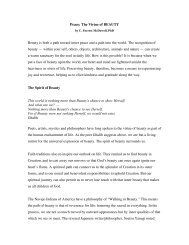Three Cortesian Devotions By Christopher Forrest McDowell, PhD A ...
Three Cortesian Devotions By Christopher Forrest McDowell, PhD A ...
Three Cortesian Devotions By Christopher Forrest McDowell, PhD A ...
- No tags were found...
You also want an ePaper? Increase the reach of your titles
YUMPU automatically turns print PDFs into web optimized ePapers that Google loves.
our yard, a few potted plants in the corner of our living room, or just one small AfricanLily sitting by our computer. Nor if it is a vast wilderness, or a nearby park. Theexamples are endless, and they should be! For in each instance we should realize thatplaces act as mirrors to our lives, reflecting our good or ill will, passion or indifference,towards them back onto the people whose lives they touch. “Places, as well as people,”Tom Bender reminds us, “draw sustenance from how they are held in our hearts. Howwe feel towards them nurtures them, and they in turn nurture us.” (Side bar about A PlaceCalled Home in L.A.; the inner city gardens in NY)On a macro level, Earth can be viewed as a kind of household in which humanity isseeking to understand its wisdom and to find a sense of place in it. In fact, the wordecology literally means “household wisdom.” In this sense, each of us who holds ourpersonal places of home, desktops, car interiors, yards, nearby parks, and other outdoorsettings as dear to the heart are budding ecologists. It sounds strange, yes, and mostpeople would not want to be seen as an ecologist, per se, only because they believe to bean ecologist means to be an activist as well. But, activism comes in many forms. Someof us choose to join or lead a cause to “save places” or lives, as it were. Most of us,however, can activate a more personal sense of heart, and take charge at that point. It isthis type of “thinking with the heart and feeling with the mind” that is a <strong>Cortesian</strong>activism of reverence for life.A <strong>Cortesian</strong> activist, if I may use that term without offending anyone, recognizes thatshe or he travels within and among the micro-households (i.e. places) of other cultures,plants, animals, and natural phenomena. What is respected, therefore, is the knowing thateverything has its inherently wise and intuitive sense of place: where it belongs and howand why it must bond and evolve within the natural order of things and relationships inthat place. All too often our human arrogance has overlooked the intricate details andhistory of evolution of a natural setting or another culture. For example, in our need toget what we want from nature, we often are not aware of our impact and subsequentupsetting of the inherent balance of vegetal or animal life in a particular naturalenvironment. We forget that a “biotic community” has developed, one that has stood thetest of and forging of time and of survival. This pocket of nature has shown itselfsingularly fitted to the conditions of that particular place. It has its own beauty with anunsurpassable sense of rightness. We might say the same of a specific culture in ouroverlooking their sacred geography, heritage, spiritual beliefs, folklore, and familialbonds to place.A <strong>Cortesian</strong> perspective attempts to consciously honor the principle of place, be it forhumans or nature. It honors the uniqueness of a culture and how that culture’s heritageand legacy can be sustained and regenerated. It honors the need of humans to feel a senseof dignity where they live and to feel safe, secure, and at peace. It honors what areperhaps the greatest needs of what is called the biocommunity of a given natural setting:the need for preservation of stability and diversity of plant and animal species, and theneed to maintain interdependent relationships among such species.



